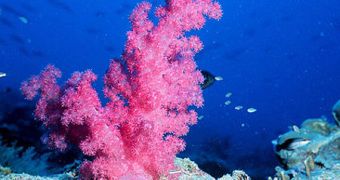Over the past century, our planet has been warming at a slow but sure rate. Largely the byproduct of human pollution and the release of vast amounts of greenhouse gases in the atmosphere, this global warming has been triggering a host of side-effects, including the acidification of the world's oceans. This happens largely on account of the GHG carbon dioxide (CO2), which is capable of triggering the production of acid inside the waters. All this pollution is dramatically affecting the way coral reefs live, and researchers say that we may be currently witnessing the corals’ evolution.
When carbon dioxide is sucked from the atmosphere by microscopic organisms living at the surface of the ocean, it is largely consumed, and then taken to the ocean floor, where it is deposited. This makes the oceans the largest carbon repositories in the world today. But the passing of CO2 through the waters also has an additional effect, and namely the formation of carbonic acid. This byproduct is the principal driver behind oceanic acidification, and researchers state the chemical has a devastating effect on coral reefs, and their survival rates.
“Corals have a substantial potential to evolve, and this is the high time for them to do it. I want to watch them very closely as it happens to see how evolution works,” says University of Texas in Austin (UTA) assistant professor of integrative biology and coral DNA expert Mikhail Matz. The expert is part of a group of investigators that is currently keeping a close eye on the way acidification is influencing the corals at a genetic level, perhaps promoting substantial evolution and adaptation. “How does the genome drive variation in gene function, and how does it lead to physiological modifications and eventually adaptation to the changing environment? We want to forge those links,” Matz explains, quoted by LiveScience.
“Imagine someone having an evolution- or biomedicine-related question that can be best addressed using some obscure marine worm as a model. We want to show how to do it – basically, how to elevate your favorite worm to the state of full-blown genomic model in a matter of several months,” the expert adds. He and the UTA group he is leading managed back in 2009 to sequence the entire transcriptome of corals, the set of RNA molecules that show which genes are functioning at any given time. “The old corals are dying, yes, but that's a part of evolving. This may be horrible news, or this can be good news, all depending on how the next generation of corals turns out. Once we know how corals evolve, we might be able to help them in this, or at least avoid standing in evolution's way,” Matz concludes.

 14 DAY TRIAL //
14 DAY TRIAL //